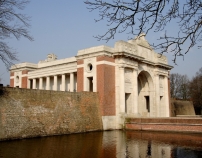| First Name: | Frank James | Last Name: | FOYER | |
|---|---|---|---|---|
| Date of Death: | 08/05/1915 | Lived/Born In: | Fulham | |
| Rank: | Private | Unit: | York & Lancaster1 | |
| Memorial Site: | Menin Gate, Ypres | |||
Current Information:Age-20 70, Langthorne Street, Fulham Born-Walworth Battle of Frezenberg Ridge (8 May-13 May) In April 1915 the Germans, using gas for the first time, launched an all out attack on the salient around the Belgian town of Ypres. It became a gargantuan struggle that lasted well into the next month and at the end of it, the salient, though drastically reduced, still stood. The name is deceptive because the Frezenberg ridge, which lay to the north-east of the town rose to only 50 metres above sea level and was one of a series of low ridges that ran in a generally westerly direction and branched off the main ridge that ran north-easterly from Kemmel to Passchendaele. Nevertheless, it gave a commanding view down on to the town of Ypres and for that reason it was strategically important. On 8th May, 1915 at dawn there was a violent bombardment on the front held by 28th Division on the Frezenberg Ridge. The full fury of the bombardment lasted for four hours. Parapets were flattened and trenches destroyed. At 8.30am the German guns lifted onto the support trenches and approach roads and their infantry assaulted the front of the Frezenberg ridge with the brunt of the attack falling on 3rd Monmouth and 2nd Royal Lancaster of 83 Brigade and 1st Suffolk and 2nd Cheshire from 84 Brigade. The first attacks were repelled but at great cost to the defenders and subsequent German pressure resulted in a two mile gap in the line. The reserves were hurried to the scene and at 2.40pm, 3rd Middlesex from 85 Brigade and 1st York & Lancaster from 83 Brigade, 950 strong, had arrived at Potijze and were ordered to attack either side of the railway and recover lost trenches. There followed an afternoon of heavy fighting. The German advance was checked but a lot of land was lost and 1st York & Lancaster were reduced to a skeleton battalion. Of those who had gone forward only 84 men had not become casualties by the end of the day. |
||||
| « Back to Search Results | ||||
| If you think any of the information shown here is incorrect, Click Here to submit your amends and comments | ||||




